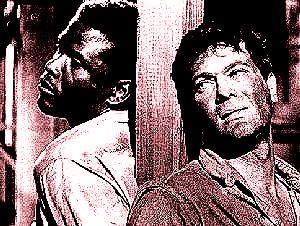Film Review

This is the film that secured Sidney Poitier's standing as Hollywood's leading African-American actor, making him an overnight star. The humanity and realism that Poitier brings to his performance in this and his subsequent films contributed significantly to the cause for racial equality, and not only in the United States. Here, he is effectively partnered with Tony Curtis, who is just as impressive in his portrayal of a hardened racist thug who is compelled to overcome his racial prejudices in order to survive. Many regard this as Curtis's finest hour; it is certainly his best dramatic role.
The Defiant Ones was directed by Stanley Kramer, a leading independent filmmaker who tackled a wide range of important social issues in the films he produced and directed around this time. He would return to the race theme in a later film, Guess Who's Coming to Dinner (1967), which again featured Sidney Poitier championing the cause for racial tolerance, albeit from a lighter perspective. Whilst this later film is better known and more accessible for a mainstream audience, The Defiant Ones is without doubt its superior, despite the all to obvious symbolism and clunky narrative. The authentic performances from Poitier and Curtis bring a sobering reality to what was, at the time of the film's release, an unpalatable truth: a person's worth is not revealed by his skin colour but by what he does and how he treats his fellow man.
© James Travers 2009
The above content is owned by frenchfilms.org and must not be copied.
Film Synopsis
A party of convicts in a chain-gang are being transported under armed guard when their van falls over the edge of a ravine. Two of the convicts, a white man named Jackson and a black man named Cullen, are uninjured in the accident and go on the run, chained together. The men's first priority is to find tools to remove their handcuffs, but when they attempt to break into a general store in a small town, they are captured and nearly lynched. One of the townsfolk helps them to escape and they continue their flight across open country. They then run into a young boy who takes them back to the small farmstead where he lives with his mother. The latter takes an instant liking to Jackson and plans to head south with him, hoping to start a new life. The woman tricks Cullen into crossing a swamp in order to get to the railway, knowing full well that he will drown in the attempt. Realising that his friend is in danger, Jackson hurries to his aid....© James Travers
The above content is owned by frenchfilms.org and must not be copied.
Similar Films
Here are some other films you may enjoy watching:- In the Heat of the Night (1967)
- Un flic (1972)
- Les Assassins du dimanche (1956)
- Cargaison blanche (1958)
- White Heat (1949)
Other related links:
Film Credits
- Director: Stanley Kramer
- Script: Nedrick Young, Harold Jacob Smith
- Cinematographer: Sam Leavitt
- Music: Ernest Gold
- Cast: Tony Curtis (John 'Joker' Jackson), Sidney Poitier (Noah Cullen), Theodore Bikel (Sheriff Max Muller), Charles McGraw (Capt. Frank Gibbons), Lon Chaney Jr. (Big Sam), King Donovan (Solly), Claude Akins (Mack), Lawrence Dobkin (Editor), Whit Bissell (Lou Gans), Carl 'Alfalfa' Switzer (Angus), Kevin Coughlin (Billy), Cara Williams (Billy's Mother), Harold Jacob Smith (Prison Truck Driver), Nedrick Young (Prison Guard in Truck)
- Country: USA
- Language: English
- Support: Black and White
- Runtime: 97 min
The very best of the French New Wave

The best of American film noir

The best of Indian cinema
